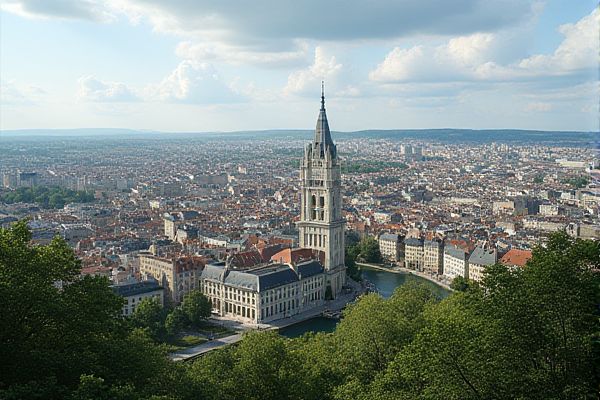
Transportation and commuting in France: Extensive rail network (SNCF). Efficient metro systems. Bus services available nationwide. High-speed TGV trains. Car-sharing options (BlaBlaCar). Bike rentals (Velib' in Paris). Uber and taxis prevalent. Comprehensive regional transport (TER). Highway toll costs. Carpooling encouraged (Covoiturage).
Extensive rail network (SNCF).
The SNCF operates an extensive rail network in France, managing over 29,901 kilometers of railway lines, including high-speed lines, electrified tracks, and a wide range of train services such as TGV INOUI, Intercites, TER, and Transilien. The network is managed by SNCF Reseau and includes international connections, with the ability to book tickets online through the SNCF Connect website or mobile app.
Efficient metro systems.
The Paris Metro is highly efficient due to its dense network, automated train operations, and effective management between public and private sectors, which keeps costs low and service quality high. Notable features include driverless trains, precise energy management, and safety measures such as platform doors and efficient waste management. The system is also expanding with new lines and stations as part of the Grand Paris Express project, further enhancing its efficiency and coverage.
Bus services available nationwide.
In France, several major bus companies offer extensive nationwide services, including FlixBus, BlaBlaCar Bus, Isilines, and Ouibus, providing comfortable and convenient intercity travel with amenities like Wi-Fi, air conditioning, and handicap-accessible buses. These services connect major cities and rural areas, with some companies also offering international routes and night bus services. You can explore more about these bus services on the Busbud website, where you can find detailed information on routes, schedules, and ticket prices, ensuring a seamless travel experience throughout the country.
High-speed TGV trains.
The TGV (Train à Grande Vitesse) is France's high-speed train service, renowned for its remarkable speed of up to 320 km/h, efficiently linking major cities across France and several neighboring countries including Belgium, Luxembourg, Germany, Italy, Spain, and Switzerland. This high-speed service offers a variety of routes, with mandatory seat reservations ensuring a comfortable journey. Passengers can enjoy amenities such as power sockets, WiFi, and the convenience of on-board bars and restaurants. For more detailed information on the TGV and its offerings, you can visit the Eurail website to explore its routes and services.
Car-sharing options (BlaBlaCar).
BlaBlaCar is a carpooling platform that connects drivers and passengers for intercity and commuter travel, allowing users to share the cost of the journey. It also offers BlaBlaLines for daily carpooling and BlaBlaCar Bus for intercity bus services, providing a cost-effective and environmentally friendly alternative to private car use in France and other European and Latin American countries.
Bike rentals (Vélib’ in Paris).
Velib' Metropole is a public bicycle sharing system in Paris and its surrounding areas, offering both mechanical and electric bicycles. The service operates 24/7 from over 1,480 stations, with options for short-term passes and annual subscriptions, including free rides for the first 30 minutes and additional charges for longer trips. For more information about this innovative service, you can visit the Velib' Metropole website.
Uber and taxis prevalent.
Uber arrived in Paris in December 2011, disrupting the taxi industry with its 'Sharing Economy' model, but its growth was marked by legal and regulatory challenges, and it has significantly impacted the working conditions and social model of French drivers. Despite these issues, Uber has become a popular transportation option, competing with traditional taxis and other ridesharing services like Kapten, Bolt, and Heetch.
Comprehensive regional transport (TER).
The Transport Express Regional (TER) is a regional rail service in France, operated by SNCF in collaboration with regional councils. This service provides extensive coverage across French regions, with over 5,700 trains daily, transporting approximately 800,000 passengers. The service is heavily subsidized, with 72% of the costs covered by the state and regional councils. It offers a variety of train types, including diesel, electric, and dual-mode rail cars, along with subscription services and tourist routes. For more detailed information, you can visit the Transport Express Regional page on Wikipedia.
Highway toll costs.
In France, highway toll costs are calculated based on the vehicle category, the specific tolls taken, and the distance traveled, with prices reviewed annually but limited by a contract with the state to not exceed 70% of the inflation rate. The average toll price is around 10 cents per kilometer, though it can vary significantly depending on the route and vehicle class. For comprehensive details on how these costs are computed, you can visit the Price Of My Journey page on the Autoroutes Sanef website, which provides insights into managing travel expenses effectively. This understanding helps travelers plan their journeys with a clear view of the expected costs.
Carpooling encouraged (Covoiturage).
In France, Carpooling (Covoiturage) is actively encouraged through various initiatives, including a national plan launched in December 2022 aiming for 3 million daily carpool trips by 2027, financial incentives such as the Forfait Mobilite Durable, and the development of over 130 carpooling lines across the country, supported by tools like the Registre de Preuve de Covoiturage and subsidies from local authorities.
